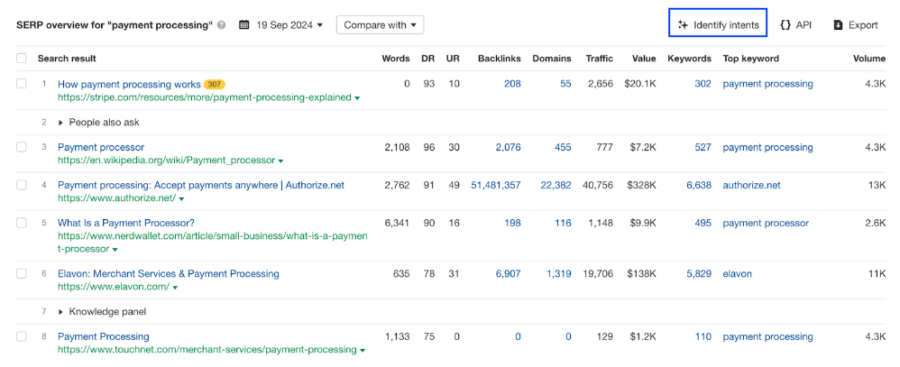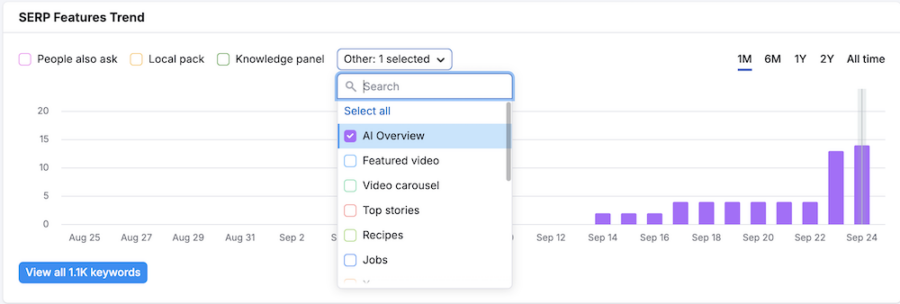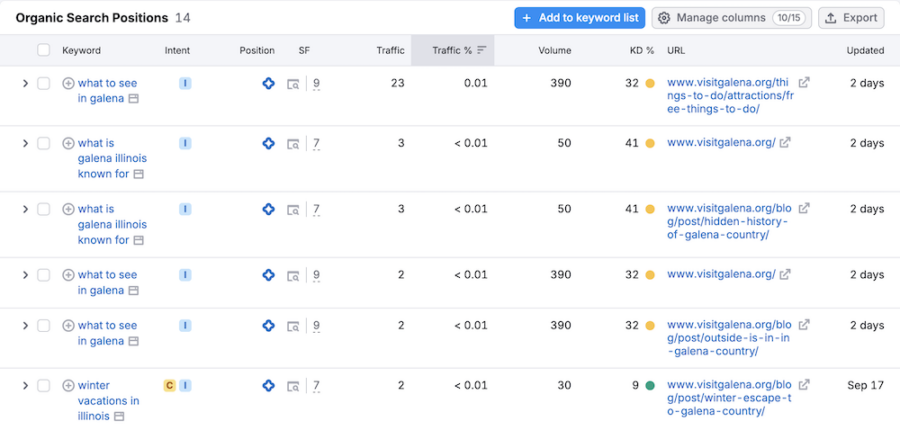What is generative engine optimization (GEO)?
Generative engine optimization, or GEO for short, is the practice of optimizing your digital content to be effectively utilized by AI language models and generative systems, aiming to enhance visibility and influence in AI-generated responses to user queries. GEO is an emerging discipline in response to advancements in AI-driven technologies and search engines, like Google’s AI Overviews and OpenAI’s SearchGPT, focusing on optimization strategies that go beyond traditional search engine results.
Generative engine optimization and traditional search engine optimization (SEO) are both essential strategies for improving online visibility, increasing brand awareness and driving traffic into your website.
Generative engine optimization and traditional SEO share a commitment to delivering high-quality, relevant content that meets user intent. However, generative engine optimization requires a more nuanced approach to structuring content and understanding how AI interprets and generates summaries. As search engines continue to evolve, SEO professionals need to adapt their strategies to ensure visibility in both traditional search results and AI-generated overviews.
First, let’s discuss the key similarities and differences between generative engine optimization and search engine optimization.
Similarities between GEO and SEO
- Keyword optimization: Both generative engine optimization and traditional SEO rely on identifying relevant keywords and phrases that potential customers use in search queries. In both approaches, strategically incorporating these keywords into content helps increase visibility and relevance in search results.
- High-quality content: In both strategies, creating valuable, informative, and engaging content remains the top priority. Search engines, whether traditional or AI-driven, favor content that effectively addresses user intent and provides a good user experience.
- User intent understanding: Both approaches require a deep understanding of user intent to align content with what users are seeking. Whether it’s answering a specific question or providing in-depth information on a topic, understanding user needs is crucial.
- Technical SEO: Elements like site speed, mobile-friendliness, and proper indexing are important in both traditional and generative engine optimization. Ensuring that a site is easily crawlable and loads quickly remains fundamental to both strategies.
- Authority and trustworthiness: Building domain authority through backlinks and creating trustworthy content is key in both traditional and generative SEO. Search engines aim to provide users with the most reliable and authoritative information, regardless of the format.
Key differences between GEO and SEO
- Optimization for AI understanding: Unlike traditional SEO, generative engine optimization focuses on optimizing content in ways that AI algorithms can easily understand and synthesize. This might involve clearer structuring of content, more explicit answers to common questions, and the use of structured data to help AI better understand the context and key points of the content.
- Content structure and format: GEO may require adjustments in how content is formatted. For example, content might need to be broken down into more digestible, AI-friendly formats such as concise summaries, bullet points, and FAQs. More traditional SEO has a broader range of effective content formats, such as long-form articles, case studies, white papers and multimedia.
- Focus on specific query types: GEO often targets query types that AI summaries are likely to cover, such as direct questions, definitions, and simple instructions. Traditional SEO can be broader, targeting a wider range of query intents, from informational and navigational to transactional.
- E-E-A-T adaptation: While E-E-A-T content principles are crucial for both, generative engine optimization may put more emphasis on clearly conveying these elements within the content. The way AI interprets E-E-A-T factors (Experience, Expertise, Authoritativeness and Trust) might differ slightly, focusing on explicit signals of expertise and authority, such as author credentials, bios and structured data.
- New technical considerations: GEO could require different technical considerations, like optimizing for emerging AI search features (such as AI-driven rich results). This could involve new markup languages or coding practices to ensure content is correctly understood and prioritized by AI.
How to Evolve Your SEO Strategy for AI Overviews
1. Prioritize user search intent above all else
Understanding user intent has always been a cornerstone of effective SEO, but it becomes even more critical with the advent of AI overviews. Marketers need to look deeper into the specific needs and queries of their target audience and create content that directly addresses these needs. Tools like Ahrefs, SEMRush, Google’s Keyword Planner and AI-driven features within these platforms can help in identifying and understanding user intent more accurately.
Pro SEO tip: My favorite data-driven approach to uncovering the search intent of a keyword is in Ahrefs. Here are directions on how to use this feature:
- Log into Ahrefs and navigate to the Keywords Explorer tab, then “Overview” section.
- Scroll to the section titled: “SERP overview for [keyword you’ve entered]”.
- Click on the “Identify Intents” button to generate keyword intent insights.

Ahrefs uses AI-technology to analyze top ranking results of the keyword and gathers common themes across the content featured in top positions. Analyzing these top ranking content assets allows us to better understand the type of information users are seeking, thus leading to search intent. Looking at the keyword example of “payment processing”, Ahrefs identified the following as the core user search intents:
- Understanding payment processing
- Finding payment processing services
- Learning about payment automation
- Comparing payment processing systems
This helpful feature speeds up the process of analyzing the intent of SEO keywords, allowing SEOs to effectively create content that meets the needs of the audience. These insights should inform content strategies. For example, if your business would like to boost visibility for the search term payment processing, it’ll be crucial for you to develop content that clearly explains what payment processing is, how to assess payment processing providers and a guide on the pros and cons of various payment processing systems.
2. Create high-quality, comprehensive content
While AI overviews prioritize brevity, they draw from high-quality, comprehensive content. Marketers should focus on creating in-depth, well-researched content that provides value to users. This not only increases the chances of being featured in an AI overview but also ensures that the content remains relevant and useful to users who seek more detailed information.
A good starting point to ensure your content meets the needs of search engines and users is with a comprehensive SEO content audit. This analysis will allow you to determine the strengths, weaknesses and opportunities across your existing content. Explore our guide on how to conduct a website SEO content audit.
3. Optimize for featured snippets
Many of the strategies used to optimize for featured snippets can also be applied to ranking in generative search engines and AI overviews. This includes using clear and concise headings, providing direct answers to common questions, and structuring content in a way that makes it easy for AI models to extract relevant information. For instance, using bullet points, bolded text, numbered lists, and short paragraphs can make content more digestible and appealing to AI algorithms. Well-structured content also strengthens the user experience, particularly for those engaging with your content on mobile devices, so it’s a win-win.
4. Optimize for more conversational search queries
To optimize for conversational queries in generative AI search, prioritize natural, long-tail keywords that reflect how people talk, similar to voice search optimization strategies. Generative AI favors direct, specific answers, so align your content with spoken language patterns. Use a question-and-answer format with concise, structured responses, avoiding jargon or overly technical terms. Clear, conversational language will make your content more accessible and relevant to AI-driven search queries, enhancing visibility and user engagement.
5. Embrace AI tools
The rise of AI overviews underscores the importance of AI in modern SEO and marketing. Marketers should leverage AI tools and platforms to enhance their content creation, optimization, and analysis processes. A few of our go-to AI tools that assist with our SEO-related tasks and workflow include ChatGPT, Claude and Gemini.
Pro SEO tip: SEMRush is a great tool to leverage AI overviews data. Here, you can measure how your website performs in the AI Overviews and which keywords generate AI overview results. You can find AI Overviews data in four places within SEMrush:
- Position Tracking
- Organic Research
- Domain Overview
- SemRush Sensor
The image below was pulled from the Domain Overview section of SEMRush. This chart shows changes in the number of separately positioned SERP features an analyzed domain ranks for. You can filter to only include specific SERP features you’d like to focus in on – for example, AI Overview. This example is for one of my tourism marketing clients, Visit Galena. As you can see, AI-generated results are becoming more and more relevant within the travel and tourism vertical.

Within SEMRush, you can also view the individual keywords that are generating AI overview response on Google. In this example, I see that users searching for what to see in Galena, what is Galena known for and winter vacations in Illinois all generate an AI overview response. Knowing this allows me to use generative engine optimization strategies to fine-tune their content and set ourselves up to rank well within the AI-driven search results.

Learn more about tracking AI Overviews data in SEMRush here.
Additional considerations when integrating AI into your SEO workflow
Be mindful with your AI prompts
Prompt engineering is the process of crafting effective instructions or inputs to guide AI models in generating specific, high-quality outputs. For SEOs using AI to create content, prompt engineering is a vital skill because it allows them to produce material that is more personalized, engaging, and relevant to connect with their target audience. Vague or generic prompts can lead to outputs that lack originality and sound similar to what everyone else is producing. This can dilute brand differentiation and reduce the effectiveness of marketing efforts.
Ethical and regulatory considerations
The rise of GenAI overviews also brings to the forefront important ethical and regulatory considerations. Ensuring the accuracy, fairness, and transparency of AI-generated content will be crucial in maintaining user trust and preventing the spread of misinformation. Industry stakeholders, including search engine companies, regulators, and marketers, will need to collaborate to establish guidelines and best practices for the responsible use of AI in search.
The role of human oversight
Despite the advancements in AI technology, human oversight will remain essential in ensuring the quality and reliability of AI overviews. SEO experts and content creators will play a crucial role in monitoring AI-generated content, addressing inaccuracies, and providing the human touch that AI models lack. This collaborative approach between humans and AI will be key in harnessing the full potential of GenAI overviews while mitigating their risks.
Explore more from our blog series covering AI’s impact on the digital marketing landscape, including:
- How OpenAI’s SearchGPT is transforming the search landscape
- The impact of AI Overviews on marketers and consumers
Partner with Envisionit and excel in the future of search
Looking ahead, it’s clear that generative engine optimization and AI search technologies are poised to play a significant role in the future of search. They represent a natural evolution in the quest for more efficient, accurate, and user-friendly search experiences. However, their success will depend on the continued refinement of AI models and the ability of SEO experts to adapt and innovate.
Get in touch with our team to discuss how our SEO experts can boost your digital marketing success in the AI-driven search landscape.













